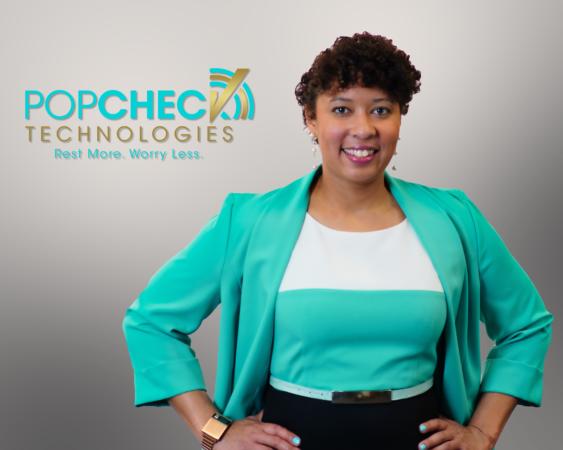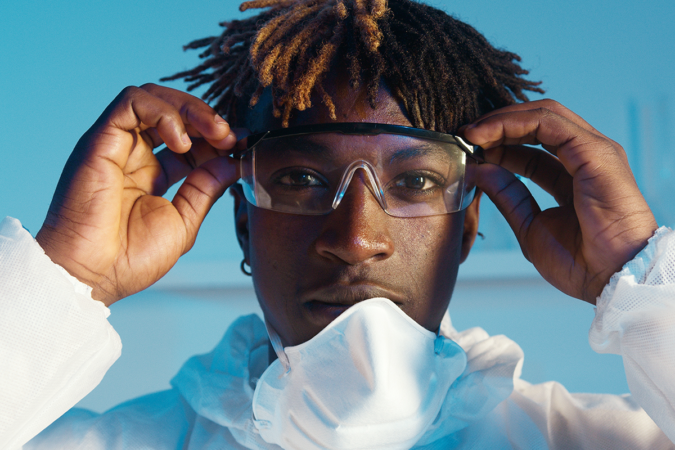If you’re familiar with Memphis, Tennessee, you may immediately think of BBQ, basketball and Beale Street. But there’s so much more. Did you know Memphis is the second-largest city in the country for producing medical devices?
The medical device industry is complicated but lucrative; it’s estimated to bring about $3B annually to the local economy. With global giants like Medtronic, Smith & Nephew and a host of medical research institutions in the downtown core, Memphis contains a robust amount of medical device knowledge. Because of this landscape, it’s a no-brainer that entrepreneurs are looking to the city when developing products and ideas in the medical device space.
Erika Dillard, MD, PhD, is among one of the emerging entrepreneurs launching into this space with her product, PopCheck Technologies. PopCheck is a post-operative device with the goal of preventing venous blood clots. Dillard is using her background as a physician to ensure patients have equitable access to post-surgical care and to reduce the risk of fatalities associated with clotting, specifically for people of color. Dillard’s path hasn’t been an easy one, but she’s determined to make an impact and encourage others to make strides in the medical device industry.
The Road to Medicine

As a native of Memphis, Dillard moved around a lot because of her military background and landed in Huntsville, Alabama — a city known for aeronautical engineering. While in Huntsville, she learned about the field and enrolled at Vanderbilt University to pursue a career in STEM. But after taking an elective in neuroscience, the game changed. Dillard switched her major and decided to pursue medical school. Unsuccessful after her first attempt, she moved back to Memphis and took some courses to beef up her knowledge base and become more competitive for the next round of applications. Needless to say, she was successful and fell in love with neurosurgery as a future career.
As a student, Dillard was introduced to her mentor, who she shadowed and worked for, learning about the field of neurosurgery. This helped Dillard find her place and burst into the medical field. She’s proving that surgery can go beyond the healing touch of hands and be used to implement knowledge to create something that helps people outside of the operating room.
Partnership Is the True Currency
Originally, Dillard wanted to create something specific to the skull-based neurosurgical space. Understanding the potential end-user and the culture of that specific space, Dillard began to explore the nuanced needs in her area of concentration and expertise. This is where PopCheck was born.
Dillard enrolled in the Patents2Products Fellowship Program, or P2P. This two-year fellowship is a partnership between the University of Memphis and Epicenter. The program provides a framework for scientists and medical professionals to access the tools to take a concept from ideation to a tangible product and viable company. “Beyond the knowledge-based components of the program, Epicenter provides a network in order to reach certain milestones so that each participant can be successful,” says Dillard.
Particular to the medical device industry, there are a ton of milestones an entrepreneur must meet before their technology can move forward. There are million-dollar investments, proof of concepts and patents that support the product and its viability to the intended consumer — all before the FDA approves it to enter the market. With there being so many steps beyond the ones listed here, P2P has leveraged the resources of the University of Memphis and Epicenter, as well as the Memphis community and its robust resources in the medical device industry.
The Power of the South
“Memphis is close knit enough where you don’t have to feel like everyone is competing against each other like a New York or something like that,” says Dillard. As a major city with a small-town feel, entrepreneurs can lean into the power of Memphis as a medical and logistics hub to support the success and vitality of their businesses. They can also take advantage of the small degrees of separation that connect so many.
After a brief stint in Philadelphia, Pennsylvania, Dillard admits that if you’d asked her about developing a product, Memphis wouldn’t have been at the top of her list. Philadelphia is a much larger city with more capital, but it lacks the entrepreneurial ecosystem that Memphis has.
“There is utility in having a close-knit ecosystem that has expertise,” says Dillard. The experts are everywhere. It’s that ubiquitous nature that makes Memphis the ideal place to launch a product in this space. The growing ecosystem has been the unique catalyst to create other beneficial programs that move the medical device industry forward.
Accelerate Me, Mane!
ZeroTo510 is a medical device accelerator program that helps promising startups and entrepreneurs navigate the tedious process of achieving the FDA’s clearance. Tapping into a massive network of experts, ZeroTo510 uses its resources to connect startups to mentors, investors and capital for seed funding.
“Memphis is more than FedEx. We have major players in the medical device industry, big and small, that take Memphis beyond logistics,” says Danielle Gore, Senior Manager of Innovation Programs at Epicenter.
ZeroTo510 is broadening its scope to become more diverse in its recruiting efforts. While the accelerator program is based in Memphis, it’s open to those all over the nation and is now doing more recruiting among HBCU students. “We want to make sure that all students have access to the type of programming that we offer, so exposing our programs to HBCUs helps close the access gap,” says Gore.
This focus on HBCU recruiting is an effort to expand the Black entrepreneurial base in Memphis. The additional hope is to get startups to relocate and launch their business in the city, based on the historic success and wealth of information found there.
An example of the program’s success is SweetBio, a minority-led business that created a patent-pending dissolvable membrane that uses honey to improve the healing process associated with tooth loss and produce better outcomes. A part of the ZeroTo510 program’s 2015 cohort, SweetBio leveraged all the resources and tools offered by the medical device ecosystem in Memphis.
SweetBio is also evidence of the diversity efforts the program is championing, and there are more on the way. “I am excited about the Black-owned and women-owned businesses that are in the line up from the accelerator cohorts,” says Gore.
ZeroTo510 is highlighting the beauty of what the city has to offer as a hotspot for tech and innovation — making Memphis the “it” city for the next groundbreaking medical device product.
Currently applications for its Fall 2021 Cohort are closed but, ZeroTo510 is always looking to start conversations and build relationships for upcoming cohorts.
Have an idea or know someone who could benefit from the program? Find out more here.
This editorial is brought to you in partnership with Epicenter and We Are Memphis.


